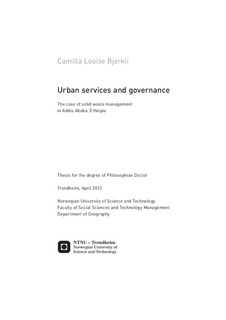| dc.contributor.author | Bjerkli, Camilla Louise | nb_NO |
| dc.date.accessioned | 2014-12-19T14:26:20Z | |
| dc.date.available | 2014-12-19T14:26:20Z | |
| dc.date.created | 2013-06-11 | nb_NO |
| dc.date.issued | 2013 | nb_NO |
| dc.identifier | 627344 | nb_NO |
| dc.identifier.isbn | 978-82-471-4357-5 (printed ver.) | nb_NO |
| dc.identifier.isbn | 978-82-471-4358-2 (electronic ver.) | nb_NO |
| dc.identifier.uri | http://hdl.handle.net/11250/265502 | |
| dc.description.abstract | This thesis explores the management of solid waste in Addis Ababa, with the objective of understanding the underlying reasons for the poor solid waste management situation that the city is faced with today. Accordingly, governance and urban political ecology are used as a theoretical framework. Governance was chosen because currently it dominates the development discourse and governance policies are implemented by governments aiming to improve urban services, whereas urban political ecology is used to explore how governance processes operate within solid waste management in the city. In order to understand the reasons for the decisions and actions that have taken place within solid waste management and to understand better the present-day situation, I focus on exploring actors’ subjective views, the nature of the power relationships between them, and politics at various scales.
An ethnographic approach is used to explore the subjective perspectives of the actors involved in solid waste management in Addis Ababa. The main method used was semistructured interviews, which were designed to collect the subjective views of the participants involved and identify conflicting interests. In addition, personal observations and document and newspaper reviews were used. The methods were used to compare the subjective views and official norms with my observations made in the field. The analysis of data started in the field, using constant comparative method, whereby all interviews were compared within a group of actors and between groups of actors and then related to the research context. This was considered a logical way to make sense of and order the information in order to confirm or dispute it, and was also one of the techniques used to ensure the reliability of the data collected.
The main findings of the study are described in the five articles that are attached to this thesis. All of the articles address the formal rules, regulations, and policies officially adopted to improve solid waste management in Addis Ababa. The official rules and regulations are compared with the findings of a detailed study of how they are adopted and implemented, by focusing on the various actors’ subjective views and agendas and how these are acted upon based on the distribution of power between them. The articles address different aspects of solid waste management, including attempts to enter into partnership with the private sector (Articles 1 and 2), attempts to plan a new solid waste management system (Article 3), the relationship between the city administration and the informal recycling sector (Article 3), international organizations’ involvement in improving solid waste in the city (Article 4) and how dominant discourses such as neoliberalism and good governance have affected solid waste management in different African cities (Article 5). The articles show how power and politics affect the way that solid waste is managed in Addis Ababa, and I argue that the promise of good governance has not resulted in the official goals being attained, but rather a rhetorical use of policies and reforms. The Ethiopian Government has adapted good governance policies to suite its own interests and agendas, and this has not led to improved governance and a more efficient management of solid waste in the city. This thesis contributes to an understanding of the underlying reasons for the poor solid waste management in Addis Ababa today, and the identification of aspects and strategies that should be in place in order to improve solid waste management and to achieve more equitable development among the various actors` involved. I conclude by arguing for a more critical approach in studies of urban services, where the focus should be on both the politics and power relationships among involved actors and on the politics of scales. | nb_NO |
| dc.language | eng | nb_NO |
| dc.publisher | Norges teknisk-naturvitenskapelige universitet, Fakultet for samfunnsvitenskap og teknologiledelse, Geografisk institutt | nb_NO |
| dc.relation.ispartofseries | Doktoravhandlinger ved NTNU, 1503-8181; 2013:127 | nb_NO |
| dc.relation.haspart | Baudouin, Axel; Bjerkli, Camilla; Habtemariam, Yirgalem M; Chekole, Zelalem Fenta. Between neglect and control. African Studies Quarterly - The Online Journal of African Studies. (ISSN 1093-2658). 11(2 & 3): 29-72, 2010. | nb_NO |
| dc.relation.haspart | Bjerkli, Camilla Louise. Governance on the Ground. International Journal of Urban and Regional Research. (ISSN 0309-1317), 2013. <a href='http://dx.doi.org/10.1111/j.1468-2427.2013.01214.x'>10.1111/j.1468-2427.2013.01214.x</a>. | nb_NO |
| dc.relation.haspart | Bjerkli, C.L.. Power in waste: Politics and conflicting agendas in planning for integrated solid waste management in Addis Ababa, Ethiopia. . | nb_NO |
| dc.relation.haspart | Bjerkli, C.L.. Questioning the contribution of international organizations to urban services: The case of solid waste management in Addis Ababa, Ethiopia.. . | nb_NO |
| dc.relation.haspart | Grest, J.; Baudouin, A.; Bjerkli, C.L.; Quénot-Suarez, H.. The politics of solidwaste management in Accra, Addis Ababa, Maputo and Ouagadougou: Different cities, similar issues.. Governing Cities in Africa. Politics and Policies: 97-131, 2013. | nb_NO |
| dc.title | Urban services and governance: The case of solid waste management in Addis Ababa, Ethiopia | nb_NO |
| dc.type | Doctoral thesis | nb_NO |
| dc.contributor.department | Norges teknisk-naturvitenskapelige universitet, Fakultet for samfunnsvitenskap og teknologiledelse, Geografisk institutt | nb_NO |
| dc.description.degree | PhD i geografi | nb_NO |
| dc.description.degree | PhD in Geography | en_GB |

